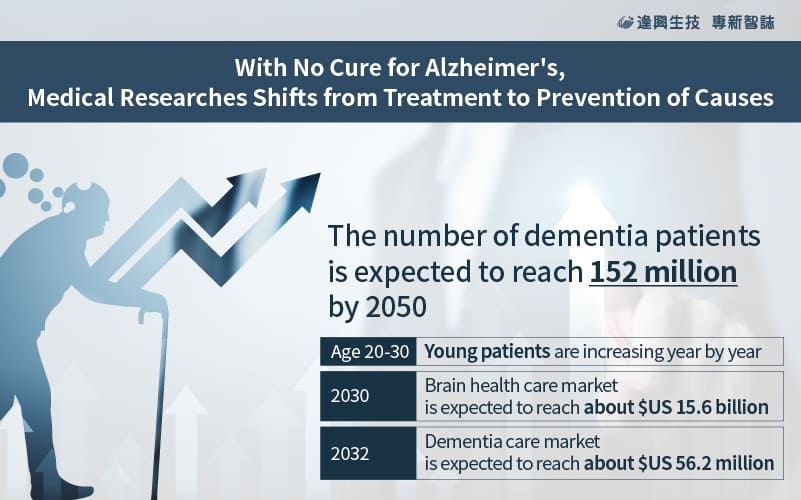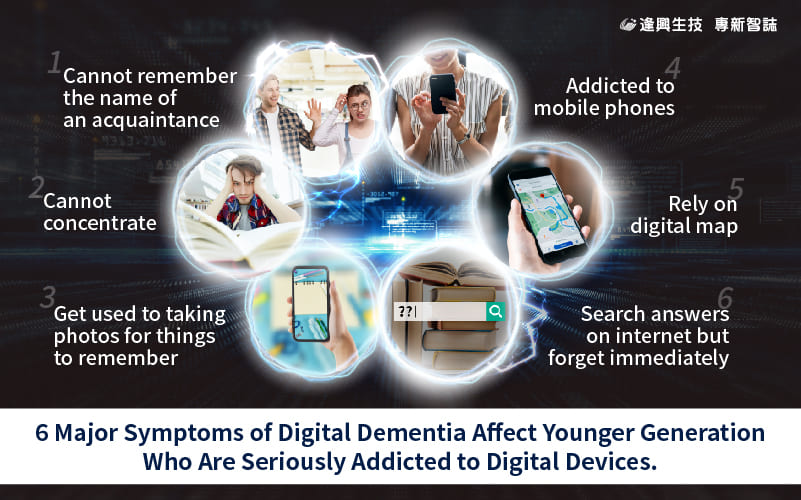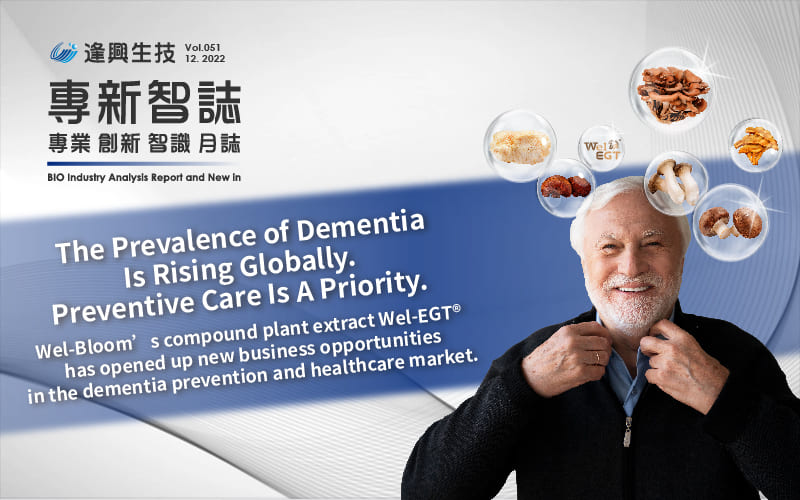Early prevention of Alzheimer’s and dementia is possible and scientific research is shifting from treatment to prevention.
The global trend of increased population aging and the onset of dementia in the younger population has raised the prevalence of dementia annually, making the early prevention of Alzheimer’s and dementia a priority concern.
According to the 2019 report of the Alzheimer’s Disease International (ADI), there were more than 50 million people with dementia worldwide, and the number is expected to grow to 152 million by 2050. This means one more person is diagnosed with dementia every three seconds, with Alzheimer’s disease being the most common.[1] As such, there is an increased need for supplements to prevent dementia and especially ensure early prevention of Alzheimer’s.
The annual healthcare costs are $US 1 trillion, and they are expected to double by 2030. The dementia care market is expected to grow at a compound annual growth rate of 6.9% from 2022-2032, reaching a market size of $56.2 million. This market includes the demand for mushroom supplements for brain health and other effective supplements to prevent dementia.
Dementia does not only affect the elderly but has now become even more prevalent in young ones. Any form of dementia that develops in people under the age of 65 is known as “early onset dementia,” which accounts for 6–8% of the global dementia population[2], including those aged 20–30, making it a global concern.
Alzheimer’s disease, an incurable disease that can be easily neglected.
When the phrase “incurable disease” is mentioned, the general public quickly associates it with cancer. However, cancer is only one of numerous incurable diseases. In fact, Alzheimer’s disease is an incurable disease that has devastating effects on patients and their families. Memories are slowly wiped out, leaving patients powerless and desperate. Other cognitive functions of the brain are also adversely affected.
While medical advances have resulted in a dramatic increase in success rates in the fight against cancer, the global medical community still regards Alzheimer’s disease as a battle to be lost. Cancer can be cured if detected early. Sadly, early detection of Alzheimer’s disease can only delay the symptoms; it cannot result in a cure. As such, rather than focusing on curing this incurable disease, the focus is gradually switching to ensuring early prevention of Alzheimer’s and more generally, dementia.
With no cure for Alzheimer’s, medical experts are turning to early prevention.
In the past, the treatment of Alzheimer’s disease has focused on the development of targeted drugs that can address the accumulation of beta-amyloid proteins.[3] However, related research has not been able to completely cure Alzheimer’s disease. According to clinical studies, patients had accumulated beta-amyloid in their brains for over a decade before the onset of the disease, making its outright elimination through treatment impractical. Thus, many medical scholars have turned to early prevention measures. [4] Many brain health foods, such as Ginkgo biloba, Omega-3 fish oil, and mushroom supplements for brain health, are starting to take off, and the market is steadily rising, growing at a compound annual growth rate of 8.31% from 2022 to 2030 and is expected to reach $15.59 billion by 2030[5].

[1] http://www.tada2002.org.tw/About/IsntDementia
[2] https://alzheimer.ca/en/about-dementia/other-types-dementia/young-onset-dementia
[3] https://sa.ylib.com/MagArticle.aspx?id=4278
[4] https://www.ncbi.nlm.nih.gov/pmc/articles/PMC6464107/
[5] https://www.globenewswire.com/en/news-release/2022/08/04/2492667/0/en/Brain-Health-Supplements-Market-is-projected-to-reach-USD-15-59-Billion-by-2030-growing-at-a-CAGR-of-8-31-Straits-Research.html
The number of dementia patients is rising, making it a global public health problem, and daily health care is the key to prevention.
The prevalence of dementia is threatening everyone’s health, and young people should take precautions to ensure early prevention of Alzheimer’s and dementia.
Japanese medical experts found that many young people nowadays are suffering from digital addiction, which may advance into “digital dementia.” Although it is not recognized as a disease, its associated memory loss and frequent errors are similar to Alzheimer’s. If ignored, the chance of developing Alzheimer’s may increase in the future. Therefore, young people should be alert to the six major symptoms listed below. Deliberate attempts to ensure early prevention of dementia is recommended if the following conditions occur frequently in daily life:[6]
- I keep using my cell phone in my spare time. I am worried about being out of touch with the world, so I always browse for new information.
- I’m often unable to concentrate, falling into a trance and frequent fatigue of the brain and body.
- I am used to taking photos of things I want to remember with my mobile phone, and I suddenly forget some words that I often write.
- When I meet an acquaintance, I can’t seem to remember his or her name. I can’t even remember the phone number of someone I know.
- I am used to searching the Internet for what I want to know, but I forget it after viewing it.
- I rely on the digital map wherever I go. Even on the return trip, I have to use the navigation to get back.

WHO lifestyle guidelines help older people prevent dementia. Mushrooms have become a trendy health food due to their high ergothioneine (EGT) content.
To prevent dementia, WHO urges people to adopt a healthy lifestyle, including non-smoking, regular exercise, avoiding alcohol abuse, weight control, a Mediterranean diet, [7] maintaining normal blood pressure, cholesterol, and blood glucose levels, etc. In addition, the elderly are also encouraged to maintain normal social activities, such as playing mahjong, hiking with friends, and other leisure activities, which can slow down the decline of cognitive ability and effectively prevent dementia. [8] Related studies have also indicated that the gut is the body’s second brain, and a healthy gut can reduce the risk of dementia. [9] So, they are encouraged to take supplements to prevent dementia. In addition to maintaining a healthy lifestyle, people can also take dietary supplements to further strengthen their health.
Ergothioneine (EGT) is also critical in the prevention of dementia. French chemist, Charles Tanret discovered this active ingredient in an ergot fungus in 1909. Later, a research team at the National University of Singapore found that mushrooms are rich in EGT, which has a high nutritional value and enormous health effects. As a result, mushroom supplements for brain health have emerged in the health market.
[6] https://tw.news.yahoo.com/news/%E5%81%A5%E5%BF%98-%E5%A4%B1%E8%AA%A4%E9%A0%BB%E7%B9%81-%E9%9D%92%E5%A3%AF%E5%B9%B4-%E6%89%8B%E6%A9%9F%E5%A4%B1%E6%99%BA%E7%97%87-%E7%BA%8F%E8%BA%AB%E6%81%90%E8%87%B4%E5%9A%B4%E9%87%8D%E5%BE%8C%E6%9E%9C-075744470.html
[7] https://www.commonhealth.com.tw/blog/4220
[8] https://heho.com.tw/archives/49468
[9] https://health.ltn.com.tw/article/breakingnews/3999994
